Can you dog folk help me out? I'm re-writing my guide to ethical breeding for my club's website and need a few peeps to proofread, both for spelling and grammer but also based on content. Does it all make sense? Anything that is missing?
..................................................
You’ve decided you want a new puppy, a purebred, but you’re not sure where to start? This guide exists to help you find the right puppy for you while at the same time educating you on how to avoid puppy mills and “backyard breeders” that are constantly contributing to the number of unwanted animals in shelters and flooding the market with poorly bred dogs that perpetuate genetic health problems and unacceptable temperaments. Before you begin contacting breeders to inquire about puppies, you need to be aware of what makes a good breeder. There are many people that do not have malicious or greedy intentions and think they are breeding for the right reasons, but unfortunately most times they are not.
Before searching for breeders, it’s important to carefully consider which breed is appropriate for your family. You need to consider the temperament, drives, and activity level of the breed, not just looks. For example, if you are looking for a German Shepherd dog, you need to be prepared for a dog that may need hours of exercise and lots of mental stimulation, a dog that is very handler-dependent and is a clingy “Velcro” dog at times. If you have selected a German Shepherd purely for looks and are looking for a breeder that breeds “pet” German Shepherds with lower drive and energy, you are doing a serious disservice to the breed by encouraging intentionally breeding dogs outside of the standard. Sometimes the dog that is right for you is not necessarily the dog whose picture you’ve picked out of the dog breed book.
What makes an ethical and reputable breeder? Only those that meet ALL of the following criteria:
1. An ethical breeder breeds for the improvement of their breed, period. They do not breed because they want to make money, because they want to experience the miracle of birth, because they think they have a dog worth breeding (according to them), because their friends want a puppy from their dog, etc. They breed because they have done enough research and competing to conclude that mating X-female to Y-male should produce dogs that express traits desirable within the breed (examples: correcting size, improving pigment, structure, working drive, etc).
2. An ethical breeder has done all appropriate health testing on their dogs. A vet’s approval does NOT count! Their dogs should be certified by third party organizations such as OFA, PennHIP, CERF, etc. proving that they are of appropriate breeding quality and free from certain health defects. Which health tests are preformed is largely dependent on the breed.
3. An ethical breeder actively shows and competes with their dogs, earning conformation titles and additional titles relevant to the breed. Which titles you are looking for will depend on the breed and your intentions for the dog. Even companion/pet dogs should come from parents who are appropriately titled. As stated earlier, it’s important that you’ve selected an appropriate breed for your family.
4. An ethical breeder is transparent, meaning they allow and invite you to ask for references from previous customers and other breeders of the breed, tour their facilities, meet their dogs, and check all of their paperwork and certifications.
5. An ethical breeder will screen and interview you before matching you with a puppy. Good breeders will not allow you to choose your puppy and will deny you a puppy if there is not an appropriate match, even if there are puppies left in the litter.
6. An ethical breeder adheres to the breed standard and is not breeding for unusual colors (that often go hand-in-hand with certain genetic health problems) or trying to create a new breed or cross. Ethical breeders should be listed in the directory of recommended breeders compiled by the breed’s kennel club.
7. An ethical breeder will require that you return the dog to them if for any reason your family cannot keep it. This is often referred to as “first right of refusal”. This is not to say that your family is not fit to care for your dog, but it proves that the breeder stands by their dogs for life.
8. An ethical breeder exposes puppies to a set program of training and socialization. Ideally, the pups are raised in the home and are never released before eight weeks of age. In many places it is illegal to sell puppies before eight weeks of age. Puppies learn important aspects of socialization from each other leading up to week eight. Removing them from their littermates deprives them of this learning period. Purchasing a younger puppy does not mean it will bond more strongly with you!
9. An ethical breeder will provide your dog with a guarantee against certain health defects and should invite you to return the dog within a certain time period if you are unhappy with it for any reason. Obviously most people become attached to their dogs even if it turns out to have a severe defect. In these cases ethical breeders will provide a second puppy, offer a refund of the purchase price, or help treat the problem.
10. An ethical breeder considers health and temperament at the top of their priority list when selecting dogs to be bred. For example, a dog that is fear aggressive should never be bred, even if it has top conformation titles.
“But, he comes with papers!”
Before we continue, I need to point out one myth that people fall for all the time: a puppy with “papers”. I hear this all the time, “But, he came with papers!” You need to understand that purebred is not the same as well-bred. A puppy can be a purebred with a three or more generation pedigree, be registered with a kennel club, and still be bred in a puppy mill from inbred parents with health defects and poor temperaments. Your pup should come with an official pedigree and some form of kennel club registration (limited or full), but you must understand that this alone is not an indicator of the quality of your dog. It’s sort of like an American with a social security card – our cards prove our identity and make us officially who we’re said to be, but the card and number is no indication of our character. Registries such as the AKC, UKC, CanKC, and KC unfortunately do have very strict criteria as far as breeding practices and registering dogs. Any dog can be registered as “purebred” as long as it’s parents and grandparents are pure. The registry is more like a census. Assuming the registry is responsible for insuring health and quality would be like assuming the US Census Bureau is responsible for the quality of education. Also beware of registries that are not considered reputable (APRI, CKC, etc).
The following are questions you should ask every breeder. I’ve included the answers you should be looking for, as well as answers that indicate breeders you should avoid.
At what age are the puppies released to their new homes?
Puppies should stay with the breeder until 8 weeks, minimum. Puppies learn bite inhibition and doggie socialization from their littermates at 5-8 weeks. Taking a dog home before 8 weeks means your job will be very difficult and you must have a lot of experience and knowledge in properly socializing a young pup. Also, in many places it is illegal to fly dogs younger than 8 weeks and in some states it is illegal to sell dogs younger than 8 weeks.
Where are the puppies kept?
Ideally, puppies will be home-raised and not kept in a kennel (an indoor whelping box is perfectly acceptable). Puppies who will serve as a pet/companion animal in any capacity need to be properly socialized for living in a home with humans. Also, a breeder that home-raises pups can better monitor their progress in terms of health and socialization.
What type of training and socialization program do you use?
Good breeders will be able to answer this question with specifics or even provide you with documentation on the program they use. Many breeders invite children, adult men and adult woman to handle the pups at a certain stage in their development. Good breeders also expose pups to a wide variety of sights, scents, and sounds, such as cars, people yelling, a vacuum, pots and pans, and other pets like house cats. It’s never too young to start training a puppy. An 8 week old pup should already be beginning basic obedience, crate training, and housebreaking.
Are both parents on-site?
There’s no reason why a good breeder will not let you see the parent(s) of your pup. If the sire is not on-site (and often he is not), there should be a legitimate reason such as they used a stud service or artificial insemination. The dam should always be available. You may be asked to interact with her separately as some dams can be nervous with visitors handling puppies. You should also be invited to see any of the other dogs kept on-site.
How many litters do you have each year?
Breeders producing non-stop litters or more than one litter at a time can be cause for concern. You want a pup whose parents are health certified, DNA tested, and titled and you want a pup that has been home-raised and exposed to an extensive socialization program. Breeders meeting these criteria should not have enough time to be producing several litters a year and contributing to the betterment their breed. Exceptions would be well-established kennels that staff workers.
How long will I have to wait for a puppy?
As stated above, good breeders do not have several litters a year and should not have more than one litter on the ground at a time. Once you find a reputable breeder, you should be screened before you are allowed to make a deposit. It is not uncommon to wait six months to a year for a new litter. If you are properly screened by the breeder, you may not be a match for any puppies in their upcoming litter and you may have to wait longer. Most good breeders will tell you they have way more demand for puppies than they have available puppies.
Do I get to choose my puppy?
A respectable breeder should say “no”. While you may be looking for a certain coat pattern or sex, only the breeder has been with the puppies enough to know the temperament of each. The breeder should match each family with the right puppy for them. You should be given a questionnaire or application that asks you very specific questions about how you will raise your pup, where you will keep it, what activities you will do with it, what other animals and people live in your household, etc. so that you will receive the most appropriate dog.
How many breeds do you breed?
Since the main function of a respectable breeder is contributing to the improvement of the breed, a breeder breeding more than one or two breeds at their facility is a big red flag. Sometimes breeders breed different dogs that are similar and perform similar functions, such as German Shepherds and Belgian Malinois (this is especially true for kennels producing working stock such as herding dogs or police dogs). However, a breeder breeding three or four different types of dogs, especially with unrelated breed functions is cause for concern and should be avoided.
Does the puppy come with a guarantee?
The puppy should come with a written guarantee against genetic health defects. Certifications like OFA (hips) are done after two years of age and if at that time the dog is found to have a defect, the breeder should readily take it back and work with you on either issuing a refund or matching you with a replacement dog. Good breeders will encourage you to have your dog checked by your veterinarian within 72 hours of your purchase and allow you to return the dog within a certain time frame if it is found to be in poor health or temperament.
Can I see all paperwork relevant to the quality of the parents?
Respectable breeders will not only provide any and all paperwork, they will invite you to ask to see it or offer to show it to you. You should be able to see any health certificates for the parents (and your dog, if applicable). Many breeders can even show you the X-rays submitted to the certifying organizations. Otherwise, with the registered names of the parents, you can check the databases of the health certification websites yourself. What health certifications the parents should have will depend on the breed of dog you are interested in. Please make sure to research your breed and be aware of the health defects that are common in that breed. For example, a larger dog such as a German Shepherd should have it’s hips and elbows x-rayed and certified by an organization such as OFA or PennHIP. This is done because hip dysplasia is common in poorly bred German Shepherds. This is a very painful and costly health problem. Prelim reports are NOT acceptable for breeding. Dogs cannot be OFAed until they are 24 months old. No dog should be bred before it is physically mature (2+ years for larger breeds) even if they have excellent prelim scores. Breeders should also have documentation proving DNA tests, if applicable to your breed. Aside from health concerns, you should also see proof that the parents have received certain titles. Like health concerns, what titles a dog has will vary based on the function of the breed. In general, it’s best that both parents have a “champion” title or champion-pointed from a well known club such as the AKC or UKC. Even if the puppies are meant to be a companion or working dog, being championed in the show ring indicates that the parent is free of certain defects, is in prime physical condition, and meets the standard of the breed. Besides conformation, dogs can earn titles in a wide variety of sports such as agility, tracking, canine good citizen, herding, lure coursing, field trials, obedience, and Schutzhund. Again, what titles you are looking for will depend on your breed, but be sure to research your breed at length and understand what each title means and which titles you require of both parents. Like health certifications, you can check the kennel club or organization’s database using the parent’s registered name and get a list of titles. Depending on the club or organization, there may be a fee associated with obtaining these records and not all records are available online. A good breeder will show you this paperwork and not ask you to find it yourself.
As I’ve said earlier, a respectable breeder always screens prospective buyers to make sure they are capable of raising a puppy and also to provide the best match for their family. Below are some questions you may be asked and should be prepared to answer as specifically as possible:
• Why are you interested in this breed?
• Are you looking for a specific color pattern, coat, temperament, or sex? Why?
• What other breeds have you considered?
• Have you owned this breed before?
• Have you owned a dog before?
• If it has passed, what were the circumstances of its death?
• Have you ever had an animal taken from you by Animal Control?
• Have you ever had to re-home or surrender an animal?
• Have you ever raised a puppy before?
• What is your current housing situation?
• Where will you keep the puppy during the day? At night? While you are away from the home?
• What other pets are currently part of your household?
• What people are currently part of your household?
• What is your yard like?
• Will you have a fence? Use a tie-out? Train the dog to remain in the yard?
• What is your goal for this dog? A companion? Conformation? Dog sports?
• What energy level are you anticipating in this dog?
• What activities do you plan on doing with your dog?
• Where will the dog go if you have to be away?
• What type of obedience training do you plan on doing with your dog?
Please remember………
There are millions of homeless dogs in shelters and rescues! If you are set on a specific breed, I encourage you to contact local shelters and the local breed rescue before contacting breeders. You would be surprised at the quality of dogs available through rescue organizations!
It is pure myth that dogs obtained as puppies bond more closely with their families than dogs obtained as adults.


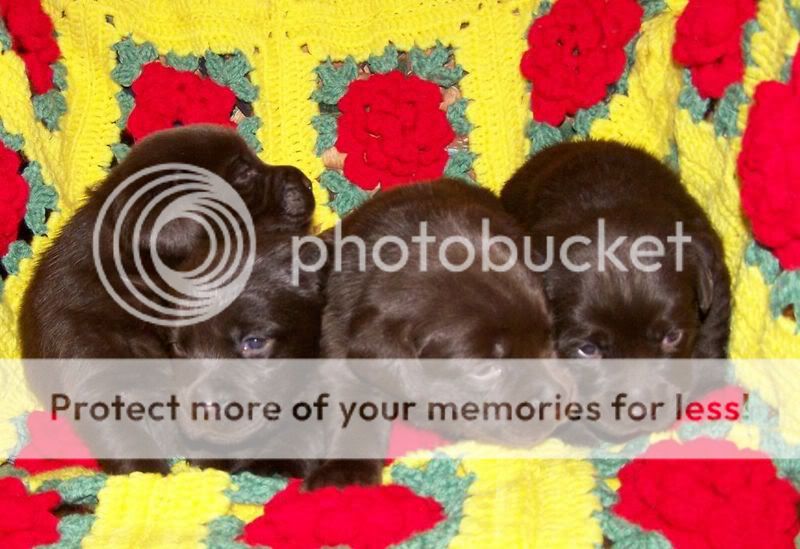

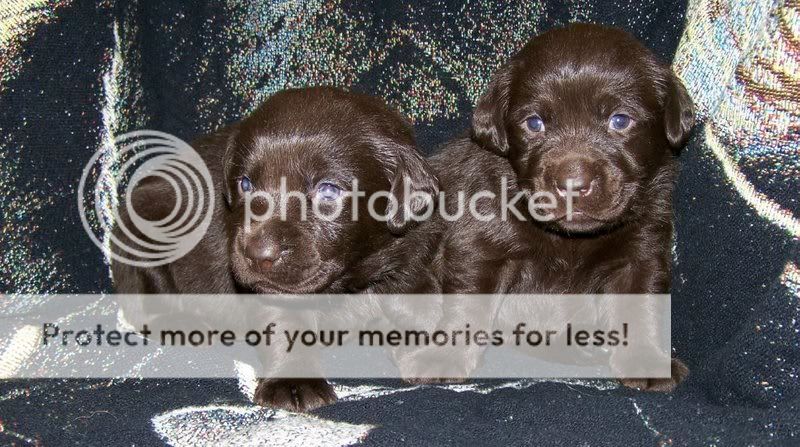

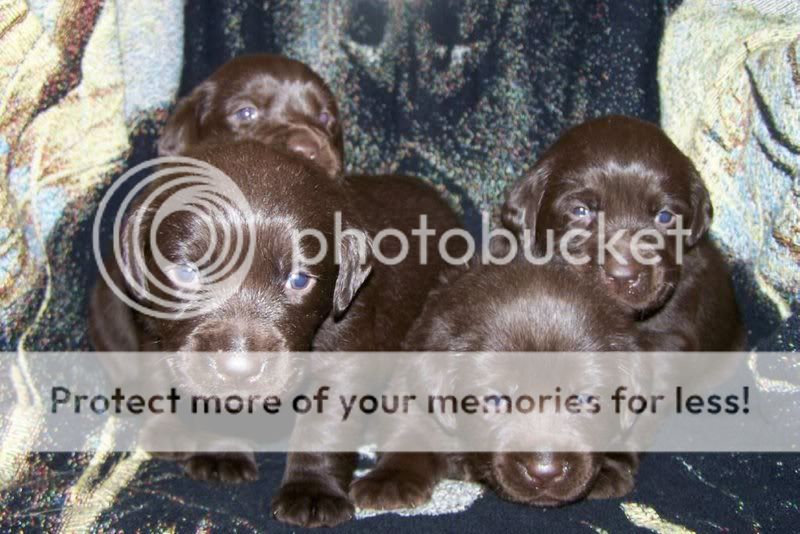

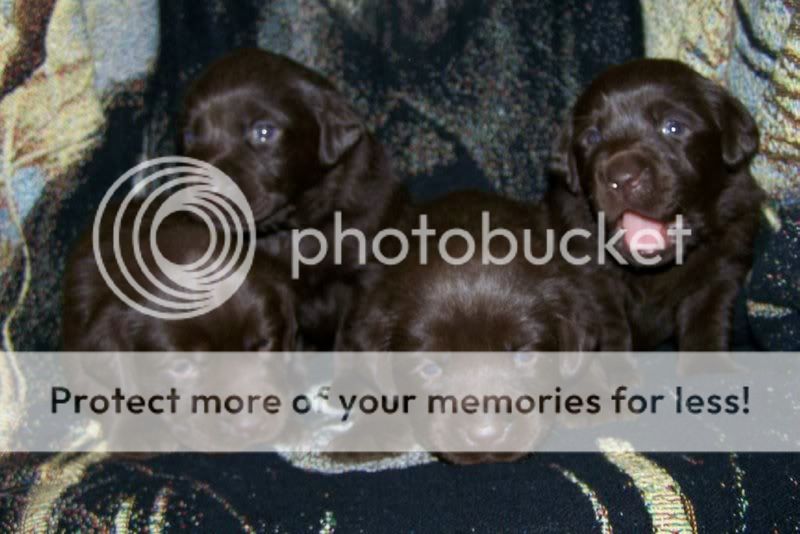
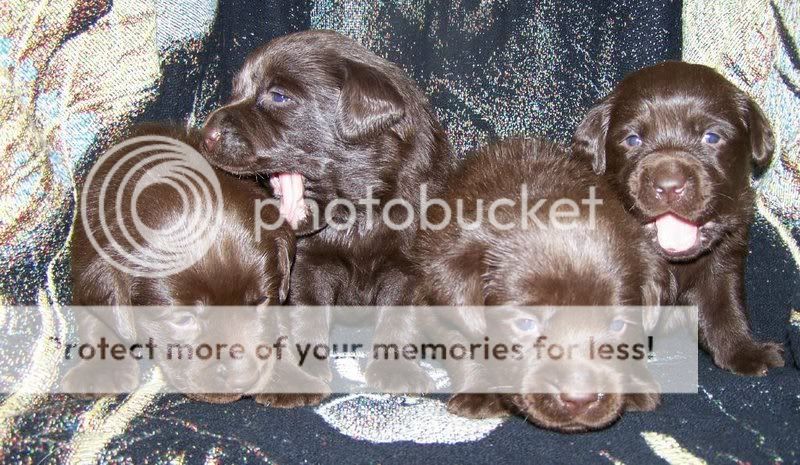

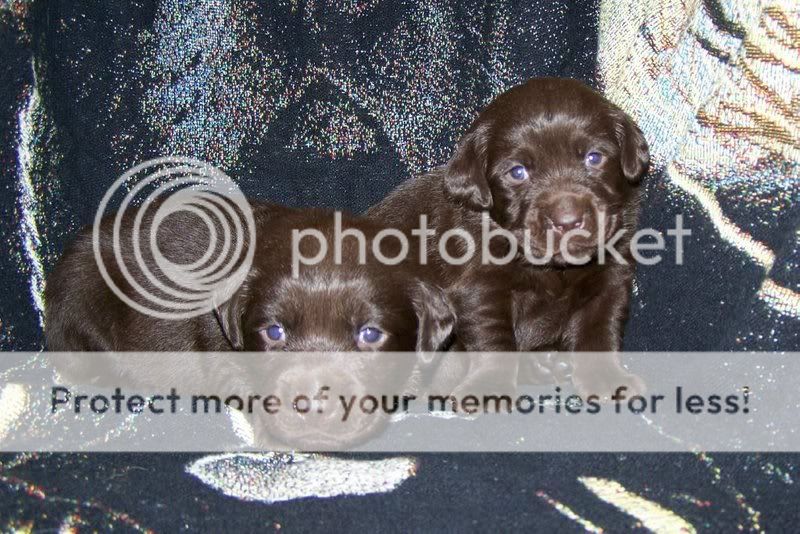


 They are only the cutest things on earth. I can't stop squeeing.
They are only the cutest things on earth. I can't stop squeeing. 
 I can't wait to meet them 1 week from tomorrow when we get to pick out our lil girl..
I can't wait to meet them 1 week from tomorrow when we get to pick out our lil girl..















 The pups are all sweet, too.
The pups are all sweet, too.  congrats on the new addition. What does Coke and Kenya think of him? And the cats what was their reaction?
congrats on the new addition. What does Coke and Kenya think of him? And the cats what was their reaction?





 QFT
QFT
 They're good at that, aren't they?
They're good at that, aren't they?





